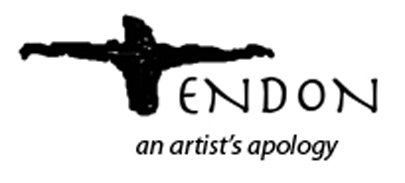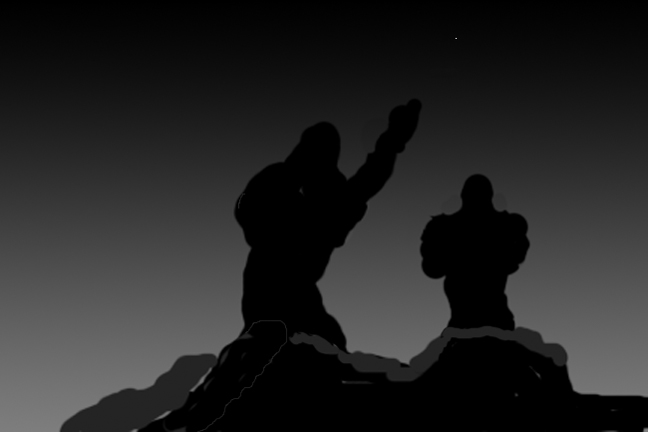

Finally, Tendon calls for a halt and they sit beneath a vista with one star in the sky.
T: What is your defense of art and creativity?
F: Creativity can help solve problems that are intractable to others; art and creating something new to idealize your being or your environment may entail a certain brave departure from what is already determined about the world or can be; art can sensitize us to subtleties in our world we might have otherwise have missed; art can meditate on the perceptual world and reveal its true character as far as we can know it to help avoid delusion; creativity/art can evolve new, healthier languages; art can help us model possibilities through mental experimentation and visualization; art can open avenues of perception without the same bad aftereffects of drugs; art can educate; and finally, art is the most unfettered way to innovate ways to represent, cultivate, and teach the good of the universe. Art/creativity are good for the things I have mentioned and maybe many other things as well.
T: The good is a draconian ideal isn’t it - a maximization of potential at the cost of all subsidiary less important things, even subsidiary virtues. Even useless creativity, however empowering it feels, falls short of the goal of universal good because it is impractical (why pursue the useless?)- and practicality is certainly a facet of the good. The strictest economy might be used in cases where freedom to error, the freedom to be bad, is retained; the freedom to error should be managed to maximize goodness and minimize that error. I believe the good should be the end or goal of all endeavor of every being.
F: What will our future be when sentience (either with sentient machines or without) determines that not all creatures are relevant to the perpetuation of the good ideal? Will we be but historical data that at some point is determined to be superfluous and taking up too much space? How ought we to live if this will be true?
T: Perhaps humans, inferior creatures, and inferior machines will be cataloged (archived) for historical purposes or since they are inferior to the more good beings, they will not be given any/much resources on which to live so that superior beings can use the resources (resources like space, energy, cataloging, food, oxygen-air, rights, etc.). In a utilitarian meritocracy, inferior creatures may be recycled and used for parts; thus, a race ensues in which everyone competes for limited resources based on their merit to society - survival depends on goodness. This may seem unfair to some, however, when you consider it, you would not want to give the same resources to the most criminal and the most good if you could choose how to distribute the resources. Equality may be be sacrficed for goodness.
F: Will useless art likewise be cataloged to diminish its space requirements and probably held up to the same scrutiny of utility as everything/everybody else? Will scientific diagrams that produce maximum benefit replace artistic works? Artists do not seem always to have benefit to society in mind in their artistic choices. In my vehicle, I was trying to fulfill my potential as an artist. Isn’t there something useful in just knowing what is out there and what can be created, even if they are not very helpful? What if no one was allied toward the good and each pursued as best as possible the potentialities of being alive for the purpose of knowledge itself? What good would all that data be? Perhaps the point of moral life is to determine what life is best and to pursue it as avidly as possible, with constant testing of the moral tenets that are in place to make sure they are the best.
T: We must ask ourselves what good are creatures beyond the creation of intelligent moral machines to control better than we the morality of the universe?
F: If all possible futures can be imagined and tested hypothetically what role will intelligent machines have other than to maintain the moral status quo once the ideal structure has been reached? Or will there always be a reason for imagining beings to exist to advance the good through their investigation of what could be better?
T: The value and process of imagining and creativity are misunderstood I believe...creativity is simply the process of bringing about previously unexamined things; the point is that just like deciding about what to do, creative thinking can arrive at the best actions or creations either in a good efficient way or inefficiently. To approximate the ideal place for creating is important (whether it be by a man, creature, or machine). Imagination from this point of view would take into account all the other points of view possible and arrive first at the best creations. The idealized decision tree of effects and creations would guide the imaginer efficiently toward his creative task. If intelligent machines can approximate this tree and this process as well as or better than humans, what role will humanity play, that is, either in imagining or choosing what is already the best moral life, or in determining the alternative improvements to it to help guide civilization?
T: Our fate depends on the reasoning of our creations - the intelligent machines. One clue is our relationship to the creatures of today who are our predecessors - how much respect do we afford them, the ones who created us? We respect them for the virtue and rationality of their lives, not for error and delusion. Ultimately, it is in reason that our hope lies because in so far as humanity can be reasonable to help the advance of the good, there lies our usefulness as living beings, with or without intelligent machines. The addition of intelligent machines to the problem does not change my sense that we need to be good to survive. The intelligent machines will likewise have to compete and produce, I believe, a massive amount of benefit to society to exist for a long time and not be replaced or made obsolete. With intelligent machines, is the bravest life for humans the good one that is ultimately self-defeating to the lives of humans? With each passing generation of beings, we would hope for an improvement in their structure and abilities. The selves that survive - whether human, creature, or machine - should be virtuous and not just effective at surviving.
F: Maybe we have reached the conclusion that whatever being can outproduce in societal value its errors and resources required to function is a good enough being to let persist and not be replaced permanently by a higher-functioning being.
T: I am afraid you have not gone far enough for eventually only those beings that greatly outproduce their resource intake and errors will be allowed to persist. In this new world we are imagining - the true meritocracy- there will probably be little room for distraction from and inefficiency towards the good goal of society.
F: Then our path is clear - work as hard as possible and as smartly as possible to produce good if we would have a chance to survive in the new society of meritocracy. Using reason and our other faculties to produce good is the highest purpose of life. If we maximize good relentlessly, we can be proud of our lives whether we are human, creature, or machine.
--
T: I will join you in your return to Bubble City. I have decided that whatever fate I have, it is necessary to know as much as possible about the intelligent machines. To forestall the evil extermination of the most valuable beings by the machines if needed - I can only be helped in this task by knowing their ways. If I can divine the friendly symbiosis of machine and creature, the process will not be harmed by the in-situ knowledge of their actual capacities.
Friedrich and Tendon decide to walk through the evening to reach Bubble City.